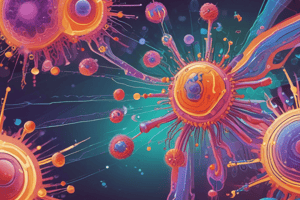Podcast
Questions and Answers
What type of immunity is produced by the individual after initial exposure to an antigen or after immunization?
What type of immunity is produced by the individual after initial exposure to an antigen or after immunization?
- Passive immunity
- Innate immunity
- Adaptive immunity
- Active immunity (correct)
What is the duration of passive immunity?
What is the duration of passive immunity?
- Perpetual
- Lifelong
- Long-lived
- Temporary (correct)
What is the primary response during the initial exposure to an antigen?
What is the primary response during the initial exposure to an antigen?
- Production of IgG antibodies
- Differentiation of T cells
- Activation of B cells
- Production of IgM antibodies (correct)
What is the main reason for the rapidity of the secondary response?
What is the main reason for the rapidity of the secondary response?
What is the function of T lymphocytes in the immune response?
What is the function of T lymphocytes in the immune response?
What is the characteristic of the IgG response in the secondary response?
What is the characteristic of the IgG response in the secondary response?
What occurs during the latent period or lag phase of the primary response?
What occurs during the latent period or lag phase of the primary response?
What is the type of response that involves the host's immune response?
What is the type of response that involves the host's immune response?
What is the term used to describe the manifestation of allergic conditions in a family?
What is the term used to describe the manifestation of allergic conditions in a family?
What type of hypersensitivity reaction occurs when an antibody attaches directly to an antigen in the target tissue?
What type of hypersensitivity reaction occurs when an antibody attaches directly to an antigen in the target tissue?
What is the result of the interaction between IgG antibodies and the antigen in Type II hypersensitivity?
What is the result of the interaction between IgG antibodies and the antigen in Type II hypersensitivity?
What is an example of Type II hypersensitivity?
What is an example of Type II hypersensitivity?
What is the term used to describe the phenomenon where cell membranes sometimes lose their 'self' identity and become alien, leading to an immune response against self?
What is the term used to describe the phenomenon where cell membranes sometimes lose their 'self' identity and become alien, leading to an immune response against self?
What type of reaction occurs in individuals with type A blood when they receive type B blood?
What type of reaction occurs in individuals with type A blood when they receive type B blood?
What is the result of the activation of complement activation in Type II hypersensitivity?
What is the result of the activation of complement activation in Type II hypersensitivity?
Why do people with type A blood have anti-B antibodies in their blood?
Why do people with type A blood have anti-B antibodies in their blood?
What percentage of white blood cells are lymphocytes?
What percentage of white blood cells are lymphocytes?
Where do pre-T cells migrate to and divide into T cells?
Where do pre-T cells migrate to and divide into T cells?
What is the main function of regulatory cells in the immune response?
What is the main function of regulatory cells in the immune response?
What percentage of lymphocytes are B cells?
What percentage of lymphocytes are B cells?
What is the result of lymphocytes being stimulated by their antigen?
What is the result of lymphocytes being stimulated by their antigen?
What is the primary function of effector cells?
What is the primary function of effector cells?
What type of immunity is acquired through previous exposures to infectious and other foreign antigens?
What type of immunity is acquired through previous exposures to infectious and other foreign antigens?
What is the process by which lymphocytes mature into distinct types?
What is the process by which lymphocytes mature into distinct types?
What is the result of adding type B blood to a type A blood recipient?
What is the result of adding type B blood to a type A blood recipient?
What is the mechanism of action of autoimmune antibodies in myasthenia gravis?
What is the mechanism of action of autoimmune antibodies in myasthenia gravis?
What is the outcome of the combination of antigen and antibody in immune complex formation?
What is the outcome of the combination of antigen and antibody in immune complex formation?
What is the location where immune complexes are deposited in Glomerulonephritis?
What is the location where immune complexes are deposited in Glomerulonephritis?
What is the term for the systemic reaction that occurs when immune complexes deposit in many tissues?
What is the term for the systemic reaction that occurs when immune complexes deposit in many tissues?
What is the role of immune complexes in autoimmune diseases?
What is the role of immune complexes in autoimmune diseases?
What is the target of autoimmune antibodies in Rheumatoid arthritis and SLE?
What is the target of autoimmune antibodies in Rheumatoid arthritis and SLE?
What is the outcome of the activation of complement in immune complex formation?
What is the outcome of the activation of complement in immune complex formation?
What is the approximate frequency of selective IgA deficiency in the population?
What is the approximate frequency of selective IgA deficiency in the population?
What is a characteristic feature of Di George Syndrome?
What is a characteristic feature of Di George Syndrome?
What is the underlying cause of SCIDS?
What is the underlying cause of SCIDS?
What is the typical outcome for infants with SCIDs caused by reticular dysgenesis?
What is the typical outcome for infants with SCIDs caused by reticular dysgenesis?
What is the goal of treatment for SCIDS?
What is the goal of treatment for SCIDS?
What is a common infection associated with selective IgA deficiency?
What is a common infection associated with selective IgA deficiency?
What is the genetic basis of Di George Syndrome?
What is the genetic basis of Di George Syndrome?
What is a characteristic feature of infants with SCIDS?
What is a characteristic feature of infants with SCIDS?
Flashcards are hidden until you start studying
Study Notes
Immune Response
- Antigen-antibody reaction can destroy RBCs in type A blood if type B blood from a donor is added, resulting in hemolysis
- IgG antibodies can bind to target-cell membrane receptors, blocking receptor function, as seen in myasthenia gravis
Cytotoxic Reaction
- Formation of immune complexes, which can cause inflammation and tissue destruction, is the cause of most autoimmune diseases
- Examples of diseases caused by immune complexes include:
- Glomerulonephritis
- Rheumatoid arthritis
- SLE
- Serum sickness
Immunity
- Immunity can be either active or passive, depending on whether the individual produces antibodies or T cells, or receives them from a donor
- Active immunity is a long-lived immunity produced by the individual after exposure to an antigen or immunization
- Passive immunity is temporary and does not provide a memory response
Primary and Secondary Response
- Primary response:
- Initial exposure to an antigen
- Latent period or lag phase
- B cell differentiation occurs
- After 5-7 days, IgM antibody is detected
- IgG response follows
- Secondary response:
- More rapid response
- Larger amounts of antibody are produced
- Rapidity is due to the presence of memory cells
T Lymphocytes
- Function in the activation of other T and B cells
- Control viral infection, rejection of foreign tissue grafts, and delayed hypersensitivity responses
Hypersensitivity Reactions
- Type 1 reactions:
- Allergic rhinitis (hay fever)
- Hives
- Some cases of asthma
- Tendency towards allergic conditions is inherited
- Type 2 hypersensitivity (cytotoxic hypersensitivity):
- Antibody attaches directly to an antigen on a cell membrane
- Example: response to an incompatible blood transfusion
Adaptive Immunity
- Immunity acquired through previous exposures to infectious and foreign antigens
- Components of the adaptive immune system include:
- T and B cell lymphocytes
- Their products
Lymphocytes
- Primary cells of the specific immune system
- Represent 25-35% of WBC
- 99% of cells reside in the lymph
- Derived from stem cells
- Mature into distinct types:
- T cells (involved in cell-mediated immunity)
- B cells (produce antibodies)
Immune Deficiencies
- Selective IgA deficiency:
- Individuals are unable to produce IgA but can produce other immunoglobulins
- Frequently present with chronic intestinal candidiasis
- Occurs in about 1 in 400
- Di George Syndrome:
- Complete or partial absence of T-cell immunity
- Characterized by severe congenital structural defects of the heart and low levels of calcium
- May result in seizures
- Exhibits a congenital aplasia or hypoplasia due to deletions on chromosome 22
- SCIDS (Severe Combined Immunodeficiency Syndrome):
- Absence of a common stem cell for all white blood cells
- T-cells, B-cells, and phagocytic cells never develop
- Most children with SCID die in utero or soon after birth
- Rare, with only about 40 cases reported each year
- Genetic mutation leading to absence of all immune function
- Treatment: bone marrow transplantation or stem cell transplantation
Studying That Suits You
Use AI to generate personalized quizzes and flashcards to suit your learning preferences.




